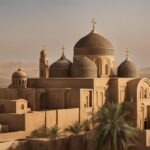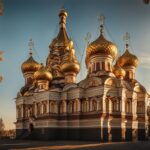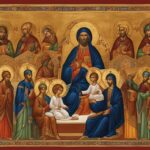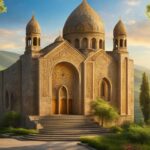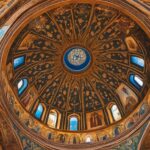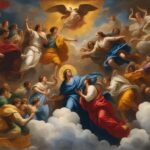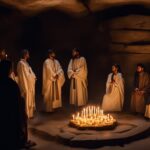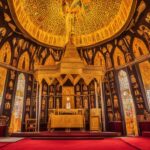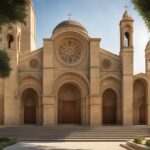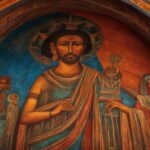The Coptic Orthodox Church, also known as the Coptic Orthodox Patriarchate of Alexandria, is an Oriental Orthodox Christian church with its roots in Egypt. Founded by St. Mark the Evangelist in the middle of the 1st century AD, it is one of the oldest Christian denominations in the world.
The Coptic Church follows the Coptic Rite for its liturgy and has its headquarters at Saint Mark’s Coptic Orthodox Cathedral in Cairo, Egypt. Throughout its rich history, the Coptic Orthodox Church has played a significant role in the development of Christianity and has faced various challenges along the way.
Key Takeaways:
- The Coptic Orthodox Church is an ancient Christian denomination with origins in Egypt.
- It was founded by St. Mark the Evangelist in the 1st century AD.
- The church follows the Coptic Rite for its liturgy.
- Its headquarters are located at Saint Mark’s Coptic Orthodox Cathedral in Cairo.
- The Coptic Church has a rich history and has faced various challenges throughout the years.
Origins of the Coptic Orthodox Church
According to tradition, the Coptic Church traces its roots back to AD 42 when it was established by St. Mark the Evangelist. The church believes it is the subject of numerous prophecies in the Old Testament, solidifying its significance in biblical history.
The early Christians in Egypt were ordinary people who spoke the Egyptian Coptic language. To this day, Coptic churches continue to use the Coptic language primarily for liturgical purposes, preserving the ancient heritage and traditions of the faith. The Coptic Orthodox Church proudly embraces its apostolic roots, aligning its life, spirituality, liturgies, and dogmas with the teachings of the early apostles, making it an authentic and Apostolic Church in every sense.
The Coptic Church, founded by St. Mark in AD 42, has a fascinating history and lays claim to fulfillments of Old Testament prophecies, making it an integral part of Christian heritage.
| Key Highlights | Details |
|---|---|
| Founding Year | AD 42 |
| Founder | St. Mark the Evangelist |
| Language | Egyptian Coptic |
| Preservation of Traditions | Apostolic thought, life, spirituality, liturgies, and dogmas |
Influence of St. Mark the Evangelist
St. Mark the Evangelist played a pivotal role in the establishment of the Coptic Orthodox Church. As one of the four Gospel writers, his teachings and traditions continue to inspire and guide the church community to this day. His missionary work in Egypt left an indelible mark on the region, shaping the course of Christianity in the country and beyond.
Beliefs and Doctrines of the Coptic Orthodox Church
The Coptic Orthodox Church holds firm beliefs and doctrines that shape its identity and guide its followers on their spiritual journey. These beliefs are rooted in the ancient traditions and teachings of the early Christian Church, emphasizing the importance of faith, unity, and salvation.
At the core of the Coptic Orthodox faith is the belief in the Holy Trinity—the Father, the Son (Jesus Christ), and the Holy Spirit—as one divine essence. This belief underscores the unity and inseparability of the three persons in the Godhead.
The Coptic Orthodox Church also upholds the doctrine of Miaphysitism, which asserts the unity of Christ’s divine and human natures in a single nature. This doctrine, derived from the early ecumenical councils, affirms the full divinity and humanity of Jesus Christ, emphasizing the mystery of the Incarnation.
An integral aspect of the Coptic Orthodox faith is the veneration of the Virgin Mary as the Theotokos, the Mother of God. The Coptic Church considers her to be the most revered and honored saint, believing in her perpetual virginity and her role in the redemption and salvation of humanity.
“Mary, the pure dove who bore the Son of God, enlightened the darkness of the world with her divine light.” – St. Cyril of Alexandria
The Coptic Orthodox Church places a strong emphasis on the sanctity of life, cleaving to the belief in the inherent value and dignity of every human being. This includes a commitment to the preservation of life from conception to natural death, opposing practices such as abortion and euthanasia that compromise the sacredness of life.
Another significant tenet of the Coptic Orthodox faith is the belief in the resurrection of the dead and the final judgment. It teaches that after death, every person will face divine judgment, and their eternal destiny will be determined based on their faith and deeds in this earthly life.
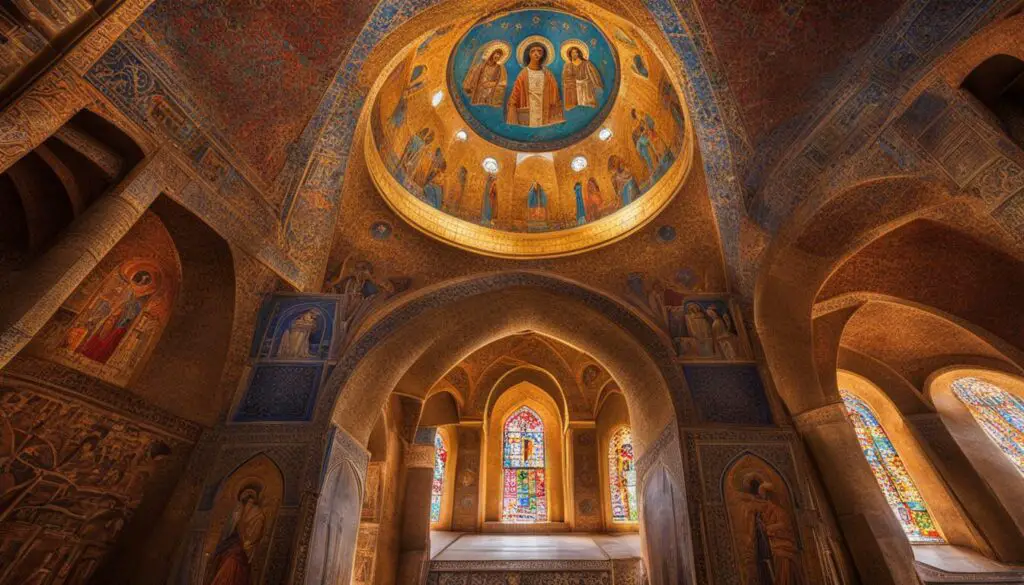
Sacraments and Rituals in the Coptic Orthodox Church
The Coptic Orthodox Church, with its rich history and traditions, incorporates a variety of sacraments and rituals into its worship practices. These sacred ceremonies hold immense significance for Coptic Christians, marking important milestones in their spiritual journey.
Sacraments
The Coptic Orthodox Church acknowledges seven sacraments that are considered essential for the spiritual life of its followers:
- Baptism: A sacrament of initiation, symbolizing the cleansing of sins and rebirth in Christ.
- Chrismation: The anointing with holy chrism to receive the gift of the Holy Spirit.
- Eucharist: The partaking of the body and blood of Christ through the sacrament of Holy Communion.
- Confession: The confession of sins and reception of absolution.
- Holy Orders: The ordination of clergy, including bishops, priests, and deacons.
- Matrimony: The sacrament of marriage, blessed by the church.
- Anointing of the Sick: The anointing of the sick for healing and spiritual strength.
Rituals
Alongside the sacraments, the Coptic Orthodox Church follows various rituals and liturgical practices that enrich its worship experience:
- Divine Liturgy: A solemn and sacred liturgical service, culminating in the celebration of the Eucharist.
- Liturgy of the Word: The proclamation and interpretation of scripture during the liturgical service.
- Rite of the Burial of the Dead: The funeral rites and prayers performed for the departed.
These rituals provide a framework for communal worship, leading the faithful towards a deeper connection with God and fostering spiritual growth.

In addition to these sacraments and rituals, the Coptic Orthodox Church places great emphasis on prayer and fasting as integral components of worship. These practices serve as a means of drawing closer to God, seeking His guidance, and nurturing the soul.
“The sacraments and rituals of the Coptic Orthodox Church are sacred and transformative, allowing believers to experience the divine presence and receive spiritual nourishment. Through these ancient practices, Coptic Christians are reminded of their faith’s timeless traditions and the significance of their relationship with God.”
The Coptic Orthodox Church’s sacraments and rituals offer a profound and meaningful spiritual experience, weaving together centuries-old traditions with the contemporary worship practices of the faithful.
Leadership and Clergy in the Coptic Orthodox Church
The Coptic Orthodox Church, also known as the Coptic Orthodox Patriarchate of Alexandria, is guided by a strong leadership and a dedicated clergy. At the helm of the church is the Pope of Alexandria, who serves as the head of the church and the See of Alexandria. Currently, the esteemed Pope Tawadros II leads the Coptic Orthodox Church with wisdom and devotion, ensuring the spiritual guidance and direction of its faithful.
Assisting the Pope are the bishops, priests, and deacons, who play vital roles in the ministry and administration of the church. Bishops are ordained to provide spiritual oversight and guidance to the clergy and the faithful within their respective dioceses. They are responsible for leading the charge in upholding the doctrines, traditions, and teachings of the Coptic Orthodox Church.
The priests, ordained by the bishops, serve as the shepherds of their local congregations. They administer the sacraments, deliver sermons, and offer pastoral care to the members of the Coptic community. Through their guidance, priests provide spiritual support and nurture the spiritual growth of their parishioners.
The role of deacons in the Coptic Orthodox Church is to assist in the liturgical services and support the clergy in their duties. They participate in the administration of the sacraments and aid in the smooth functioning of the church’s rituals and worship practices. Deacons are valued for their commitment to service and their dedication to the Coptic community.
It is important to note that the clergy of the Coptic Orthodox Church adhere to celibacy, devoting themselves entirely to the spiritual care of the faithful. They are entrusted with the responsibility of celebrating the sacraments, teaching the doctrines of the church, and guiding the Coptic community on their spiritual journey. Through their commitment and selflessness, the clergy of the Coptic Orthodox Church exemplify the virtues of leadership and service.

Quote:
“The clergy of the Coptic Orthodox Church exemplify profound dedication and selflessness, serving as beacons of spiritual guidance and inspiration for the faithful.”
Worship Practices in the Coptic Orthodox Church
The Coptic Orthodox Church places great emphasis on worship and the celebration of the Divine Liturgy, which holds deep significance for its followers. The liturgy, conducted in the sacred Coptic language, encompasses a range of spiritual practices and rituals that enrich the experience of worship.
During the Divine Liturgy, Coptic Orthodox Christians engage in heartfelt prayers, sing hymns, and participate in the chanting of sacred verses from the Holy Scripture. These elements, combined with the reading of scripture, create an atmosphere of reverence and spiritual connection.
The Coptic Orthodox Church also embraces a rich tradition of liturgical music, which serves as a powerful form of worship. Various musical instruments, such as the oud, cymbals, and the triangle, accompany the melodic hymns sung during the Liturgy, enhancing the spiritual experience for the congregation.
As active participants in worship, Coptic Orthodox Christians express their devotion through physical gestures. They stand, kneel, and make the sign of the cross, symbolizing their reverence and submission to God.
Symbols and Rituals in Coptic Worship
In addition to the Divine Liturgy, the Coptic Orthodox Church incorporates several meaningful symbols and rituals into its worship practices:
- Incense: The use of incense during worship represents the prayers of the faithful rising to heaven and purifying the atmosphere during the Eucharistic celebration.
- Holy Icons: The presence of holy icons in Coptic churches serves as a visual aid to prayer, reminding worshippers of the spiritual reality beyond the material world.
- Processions: Special processions take place during significant feasts and events, where clergy and the congregation carry crosses, icons, and relics, symbolizing their faith and devotion.
- Prayer Ropes: Some worshippers may use prayer ropes, known as “komboskini” or “tasbeha,” to aid in their prayers and maintain focus during worship.
The Divine Liturgy: A Transformative Experience
“In the Divine Liturgy, Coptic Orthodox Christians encounter the presence of God through prayer, music, and Scripture. It is a transformative experience that nurtures their faith and deepens their spiritual connection.”

The Coptic Orthodox Church’s worship practices evoke a sense of awe and reverence, enabling the faithful to engage with God on a profound level. Through the Divine Liturgy and the incorporation of symbols and rituals, Coptic worship becomes a transformative experience that unites the congregation and fosters spiritual growth.
Sacred Texts of the Coptic Orthodox Church
The Coptic Orthodox Church holds the Bible as its sacred text. Known as the Coptic Bible, it encompasses both the Old Testament and the New Testament. The church places great significance on the scriptures and has its own unique traditions and interpretations.
In addition to the Coptic Bible, the church also relies on various liturgical texts, prayers, and hymns during worship. These texts enrich the spiritual experience of the faithful and provide guidance and inspiration.
“The word of God is living and active” – Hebrews 4:12
Through the reading and study of sacred texts, Coptic Orthodox Christians deepen their understanding of God’s message and seek spiritual growth and enlightenment. The scriptures guide their faith, shaping their beliefs, and influencing their daily lives.

Selections from the Coptic Bible:
| Book | Description |
|---|---|
| Genesis | Accounts of creation, Noah’s ark, and the patriarchs |
| Exodus | The liberation of the Israelites and the Ten Commandments |
| Psalms | A collection of poetic prayers and songs |
| Gospel of Matthew | The life, teachings, and ministry of Jesus Christ |
| Acts of the Apostles | The early Christian community and spread of the Gospel |
| Revelation | The apocalyptic vision of the end times |
Denominations and Sects within the Coptic Orthodox Church
Within the Coptic Orthodox Church, there are different denominations and sects that have emerged over time. These various branches and communities contribute to the diversity and growth of the Coptic Church, while still sharing a common faith in the Coptic Orthodox tradition.
Coptic Catholic Church
One example is the Coptic Catholic Church, which is an autonomous church within the Coptic Orthodox Church. The Coptic Catholic Church maintains its own hierarchy and practices, but remains in communion with the Pope of Alexandria. It combines elements of both the Coptic Orthodox and Roman Catholic traditions.
British Orthodox Church
Another example is the British Orthodox Church, an autonomous Orthodox church that is part of the Eastern Orthodox communion. It was formed in the 19th century and follows the Coptic Orthodox tradition in its liturgy and spiritual practices. The British Orthodox Church operates primarily in the United Kingdom.
Comparing Denominations within the Coptic Orthodox Church
| Denomination | Hierarchy | Practices | Communion |
|---|---|---|---|
| Coptic Catholic Church | Autonomous | Blend of Coptic Orthodox and Roman Catholic | In communion with the Pope of Alexandria |
| British Orthodox Church | Autonomous | Follows the Coptic Orthodox tradition | Part of the Eastern Orthodox communion |
These denominations and sects within the Coptic Orthodox Church provide different avenues for worship and spiritual growth while remaining rooted in the centuries-old Coptic tradition. They serve as testament to the lasting impact and enduring relevance of the Coptic Orthodox Church in today’s world.
Contemporary Issues and Challenges
The Coptic Orthodox Church, like any religious institution, faces various contemporary issues and challenges. In recent years, Coptic Christians in Egypt have experienced increased religious discrimination and violence. They have also been affected by political changes in the region. Despite these challenges, the Coptic Orthodox Church remains steadfast in its faith and commitment to its followers.
Interfaith dialogue plays a crucial role in addressing the challenges faced by the Coptic Orthodox Church. Engaging in open and respectful conversations with individuals from different religious backgrounds helps foster understanding and promotes peaceful coexistence. By actively participating in interfaith initiatives, the church strives to build bridges and bridge differences in order to create a more harmonious society.
Another significant challenge faced by the Coptic Orthodox Church is advocating for women’s rights within its community. The church recognizes the importance of gender equality and empowering women in all aspects of life, including religious and social spheres. By promoting women’s education, leadership, and participation, the church works towards creating a more equitable and inclusive environment.
Engaging the youth is also a top priority for the Coptic Orthodox Church. Recognizing that the future lies in the hands of the younger generation, the church actively involves young individuals in its activities and decision-making processes. By nurturing their spiritual growth and providing them with opportunities for leadership and service, the church ensures a strong foundation for the future.
Despite the challenges, the Coptic Orthodox Church continues to serve as a spiritual and cultural anchor for its followers, providing them with a sense of belonging and purpose.
Key Challenges Faced by the Coptic Orthodox Church:
- Increased religious discrimination and violence against Coptic Christians in Egypt
- Political changes in the region affecting the church’s operations
- Championing interfaith dialogue to promote understanding and harmony
- Advocating for women’s rights within the Coptic community
- Engaging and empowering the youth for a strong future
The Coptic Orthodox Church recognizes these challenges and remains committed to addressing them with faith, resilience, and a commitment to its core principles.
Conclusion
The Coptic Orthodox Church, with its deep roots in Egypt, has played a significant role in the development of Christianity. From its founding by St. Mark the Evangelist in the 1st century AD to its present-day practices, the church has preserved its unique beliefs, sacraments, and worship traditions. Despite facing numerous challenges over the years, the Coptic Orthodox Church remains a thriving and vibrant Christian community.
The church’s rich history and commitment to its faith make it an enduring institution. Its adherence to Miaphysitism, the unity of the divine and human nature of Jesus Christ, sets it apart from other Christian denominations. The Coptic Orthodox Church’s emphasis on fasting, prayer, and the celebration of the sacraments fosters spiritual growth and closer communion with God.
Guided by the Pope of Alexandria and led by a dedicated clergy, the church provides spiritual care, administers the sacraments, and imparts the teachings of the Coptic Orthodox faith. Its worship practices, centered around the Divine Liturgy and steeped in the ancient Coptic language, continue to inspire awe and devotion among its worshippers.
As the Coptic Orthodox Church faces contemporary issues and challenges, it remains committed to its community and outreach efforts. It actively engages in interfaith dialogue, advocates for women’s rights, and encourages youth involvement. The church’s resilience and unwavering commitment to its traditions and beliefs make it a shining example of faith, resilience, and cultural heritage.
FAQ
What is the history of the Coptic Orthodox Church?
The Coptic Orthodox Church has a rich history and is one of the oldest Christian denominations in the world. It was founded by St. Mark the Evangelist in the middle of the 1st century AD in Egypt.
How did the Coptic Orthodox Church originate?
According to tradition, the Coptic Orthodox Church was established by St. Mark the Evangelist in AD 42. The first Christians in Egypt were common people who spoke Egyptian Coptic.
What are the beliefs and doctrines of the Coptic Orthodox Church?
The Coptic Orthodox Church adheres to Miaphysitism, which teaches the unity of the divine and human nature of Jesus Christ. They also believe in the Holy Trinity, the Virgin Mary as the Mother of God, the sanctity of life, and the resurrection of the dead.
What are the sacraments and rituals in the Coptic Orthodox Church?
The Coptic Orthodox Church has seven sacraments, which include Baptism, Chrismation, Eucharist, Confession, Holy Orders, Matrimony, and Anointing of the Sick. They also have various rituals and liturgical practices, such as the Divine Liturgy and the Rite of the Burial of the Dead.
Who leads the Coptic Orthodox Church?
The Coptic Orthodox Church is led by the Pope of Alexandria, who is the head of the church and the See of Alexandria. The current pope is Pope Tawadros II. The church also has bishops, priests, and deacons who assist in the ministry and administration of the church.
What are the worship practices in the Coptic Orthodox Church?
Worship in the Coptic Orthodox Church centers around the Divine Liturgy, which is a celebration of the Eucharist. The liturgy is conducted in the Coptic language and includes prayers, hymns, chanting, and the reading of scripture. The faithful participate by standing, kneeling, and making the sign of the cross.
What are the sacred texts of the Coptic Orthodox Church?
The Coptic Orthodox Church considers the Bible as its sacred text, including the Old Testament and New Testament. They also have various liturgical texts, prayers, and hymns that are used in worship.
Are there different denominations within the Coptic Orthodox Church?
Yes, there are different denominations and sects that have emerged over time within the Coptic Orthodox Church, such as the Coptic Catholic Church and the British Orthodox Church. These denominations have their own hierarchies and practices but share a common faith in the Coptic Orthodox tradition.
What contemporary issues and challenges does the Coptic Orthodox Church face?
The Coptic Orthodox Church faces challenges such as religious discrimination and violence against Coptic Christians in Egypt. They are also working on addressing social issues within their community, including interfaith dialogue, women’s rights, and youth engagement.
What is the significance of the Coptic Orthodox Church?
The Coptic Orthodox Church has a deep-rooted history in Egypt and has played a significant role in the development of Christianity. Its rich heritage, traditions, and commitment to faith make it an important and enduring institution.

